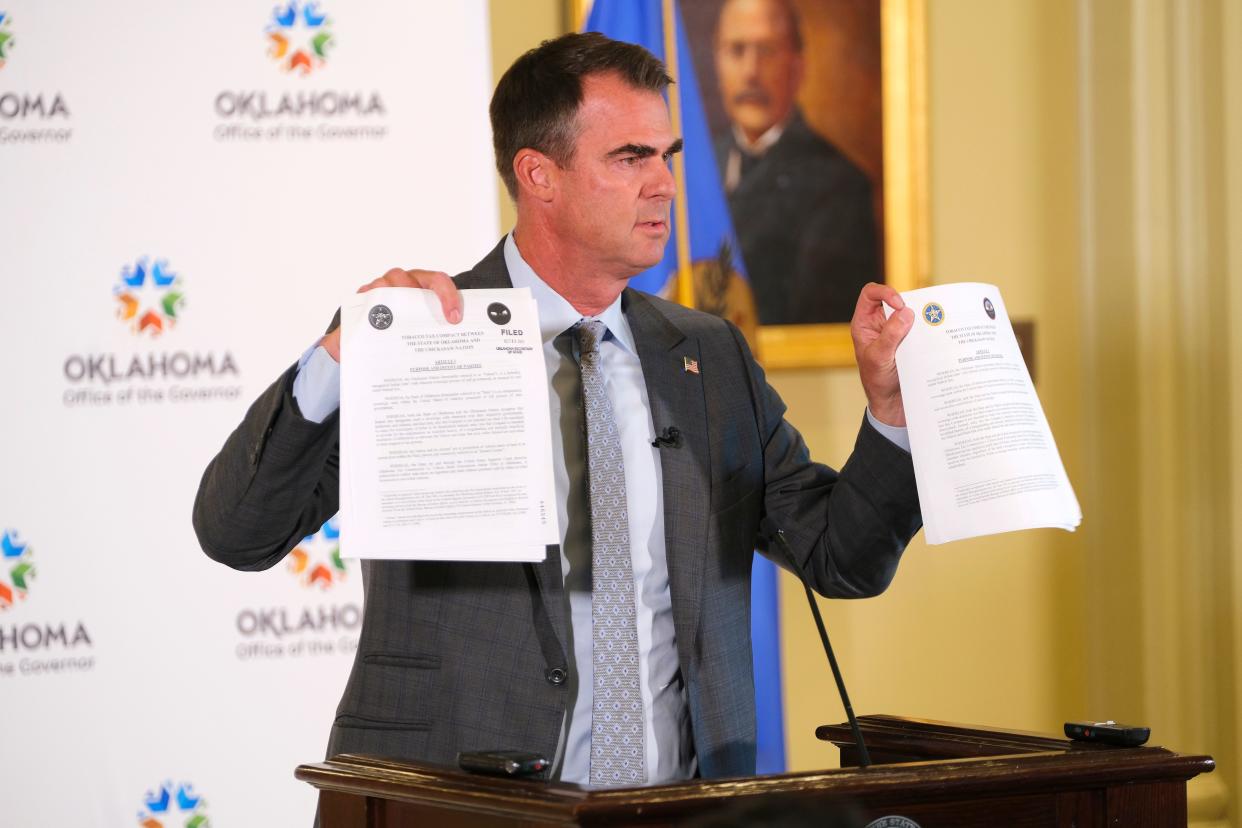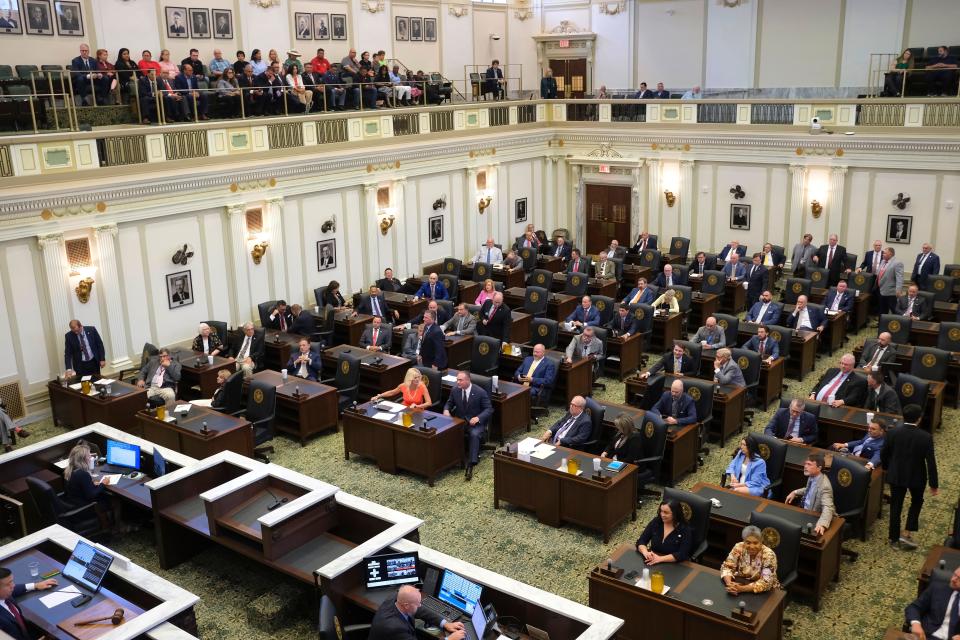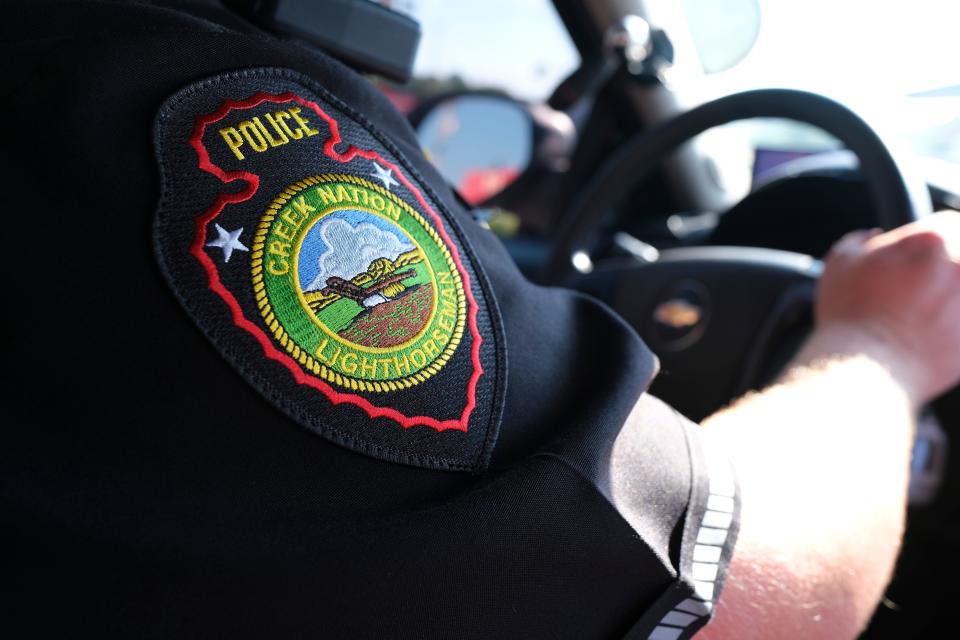What to know about Oklahoma's newest tribal compact dispute

- Oops!Something went wrong.Please try again later.
A dispute over state-tribal compacts took center stage in Oklahoma politics this summer, and the mercury could keep rising on the debate.
Gov. Kevin Stitt has asked the Oklahoma Supreme Court to block the legislature from renewing cigarette tax and vehicle tag compacts without him. Lawmakers had already approved the extensions twice, voting to override a pair of vetoes by Stitt the second time around.
The governor has cast the renewals as a gateway to “turning eastern Oklahoma into a reservation.” But others see his contempt as the latest episode in his years-long clash with tribal nations.
Here’s where the debate stands and how we got there:
Compact talks stall before lawmakers act
The compact dispute came to public light in May after the legislature unveiled its plans to reup cigarette tax and vehicle tag compacts. Several tribal leaders said negotiations with the governor’s office had been stalled for months or years before that.
Stitt wanted to increase Oklahoma’s cut to 75 percent of taxes collected on tobacco sales on tribal lands, up from the current 50-50 split.
A handful of agreements expired over the impasse. The remaining deals were set to run out this year.
Stitt eased his demands for a larger cut after lawmakers took up the issue.
But the governor has remained adamant that he won’t sign off on the agreements without a key change. He wants to prevent tribes from expanding tobacco sales throughout tribal reservations.

More: Oklahoma attorney general moves to oust Gov. Stitt from defending his tribal gaming compacts
Legislature’s role in the compact dispute
Senate President Pro Tem Greg Treat and House Speaker Charles McCall have led the push to renew the compacts for another year without any changes.
Their plan would extend the compacts through 2024.
Treat and McCall have said the extra year will give Stitt and tribal leaders time to hammer out agreements on terms that work for everyone.
Lawmakers met four times throughout the summer to vote on the plan and passed it into law July 31. Stitt sued hours later.
The governor contends lawmakers don’t have the power to renew compacts without him.
Treat and McCall have countered that it is the legislature’s job to pass and amend laws. They also say the Oklahoma Supreme Court has backed them up before, when it ruled gaming compacts signed by Stitt without legislative approval were invalid.
Friction over tribal compacts not new in Oklahoma
Compacts are agreements that governments work out to settle competing interests — like taxes — outside of court. The first tobacco compacts were signed in the early 1990s. Tensions often heat up when it is time to renegotiate the deals. They have become particularly charged since Stitt, a Cherokee Nation citizen, took office in 2019.
The governor has routinely challenged the compacts terms as unfair to the state. He has publicly criticized agreements over:
Talks between his office and tribal nations have dropped off as a result, leaving the disputes to be sorted out in public.

More: Even after compact vote, will Oklahoma’s relations with tribal nations relations improve?
Where tribal leaders stand in the compact debate
Oklahoma has 38 federally recognized tribal nations, each with distinct laws, needs and economic realities. Most have supported the legislature’s plan.
Leaders of 26 tribal governments signed on to a joint letter calling on lawmakers renew the compacts.
Five of Oklahoma’s largest tribes, the Cherokee, Chickasaw, Choctaw, Muscogee and Seminole nations, passed a resolution in support of the legislature.
Many tribal leaders also attended the final votes to override Stitt’s veto.
Gary Batton, the chief of the Choctaw Nation in southern Oklahoma, said lawmakers have made clear that they are open to working with tribal governments. “We thank the Senate and the House for their willingness to collaborate,” Batton said, “and for their endurance in correcting Gov. Stitt’s errors.”
What’s missing from Gov. Stitt’s criticism of tribal compacts
The governor has distilled his criticism of the latest compact dispute to a few key talking points he has repeated throughout the summer. Other state elected officials, tribal leaders and legal experts have described his messaging as misleading or incorrect.
“Plain and simple, the governor’s continued rhetoric and vitriol surrounding not only these compacts, but also our Native American tribal partners as a whole, seeks to divide the state,” Treat said last week.
Here are some of Stitt’s talking points, and the issues that others have pointed out:
“My job is to protect all 4 million Oklahomans and not just do a deal that’s good for one industry or one special interest group.”
Tribes are governments with certain rights and powers, much like the state of Oklahoma.
“I hope Oklahomans, I think they agree with me, that we should not pass laws that favor one race over another race.”
Tribal citizenship is a political distinction, not a racial one. Someone can be both an Oklahoma citizen and a Cherokee Nation citizen, for example.

More: What Cherokee leaders say Oklahoma's governor got 'wildly' wrong about tribal elections
The Supreme Court case at the heart of Gov. Stitt’s stance
One of Stitt’s central messages has been that he is trying to keep eastern Oklahoma from “turning into a reservation.” When he says that, he’s alluding to a landmark 2020 Supreme Court ruling — and the fallout he fears it could cause.
For a quick refresher on the McGirt v. Oklahoma decision:
Justices affirmed the Muscogee Nation reservation still exists.
Lower courts then ruled the same for seven other tribal reservations.
The reservations collectively cover much of eastern Oklahoma.
The McGirt case specifically dealt with criminal law. Stitt is worried it could ultimately limit Oklahoma’s ability to tax tribal citizens who live and work on the reservations.
The governor wants to narrow the compacts to make clear they do not apply to those reservations, only to much smaller sections of land owned by or for tribes. He’s refusing to sign off on any agreements without the change.
More: McGirt v. Oklahoma, 3 years later: How police work on the Muscogee Nation reservation
Months of uncertainty in store for state-tribal compacts, relations
Even after the legislature voted to renew the compacts, the debate is far from over. It will continue into next year.
Stitt is asking the Oklahoma Supreme Court to quash the compact extensions. The court hasn’t yet said when it will consider his request.
If the court sides with the governor, nearly all of the compacts could expire Dec. 31. If not, the renewals will last through next year.
That means that either way, the governor and tribal leaders still need to work out longer term deals — and there are no signs of that happening any time soon. Stitt said he “will not give an inch” in his demands.
Treat said lawmakers might consider changing state law to cut the governor’s office out of the negotiations when the legislature reconvenes in the spring.
The looming uncertainty has left many tribal leaders considering contingency plans, something that has happened before. After Stitt refused to extend Oklahoma’s hunting and fishing license compacts with the Cherokee and Choctaw nations in 2021, the two tribes started licensing citizens to hunt and fish without state sign-off.
More disputes could be on the horizon. Other state-tribal compacts will likely need to be renegotiated during Stitt’s time in office, including gas tax agreements.
Read more:
The story behind Gov. Stitt's new 'One Oklahoma' video on tribal reservations
This long-running lawsuit is the latest dispute over Oklahoma tribal relations
Molly Young covers Indigenous affairs. Reach her at mollyyoung@gannett.com or 405-347-3534.
This article originally appeared on Oklahoman: Understanding the tribal tobacco tax compact dispute in Oklahoma

